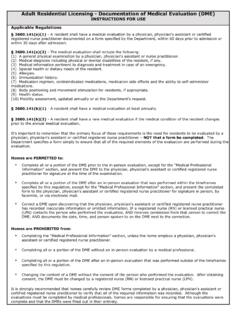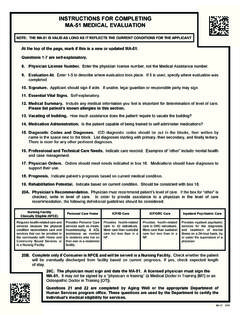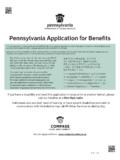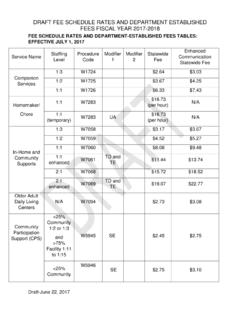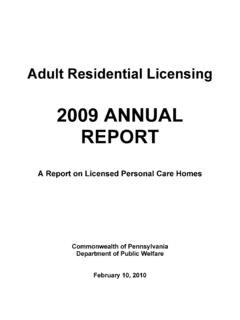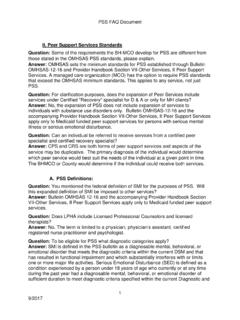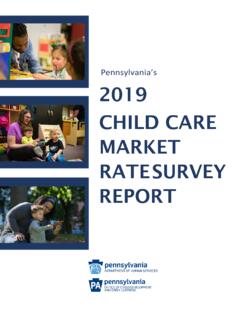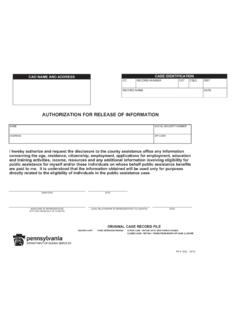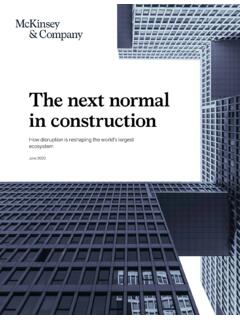Transcription of functional assessment tool - Department of Human Services
1 functional assessment Tool Manual Admission Requirements (from the PRS regulation) (a) To be eligible for PRS, an individual shall meet the following: (1) Have a written recommendation for PRS by a licensed practitioner of the healing arts (LPHA) acting within the scope of professional practice. (2) Have the presence or history of a serious mental illness, based upon medical records, which includes one of the following diagnoses by an LPHA: i. Schizophrenia. ii. Major mood disorder. iii. Psychotic disorder (not otherwise specified). iv. Schizoaffective disorder. v. Borderline personality disorder. (3) As a result of the mental illness, have a moderate to severe functional impairment that interferes with or limits performance in at least one of the following domains: i. Living. ii. Learning. iii. Working. iv. Socializing. (4) Choose to receive PRS. (b) A PRS agency shall identify and document the functional impairment of the individual in an assessment .
2 (c) EXCEPTION. Individuals who do not meet the serious mental illness diagnosis requirement under section (a) above may receive Services when the following conditions are met: (1) The written recommendation by the LPHA includes a diagnosis of mental illness that is listed on Axis I in the DSM-IV-TR or ICD-9 or subsequent revisions. (2) The written recommendation by the LPHA includes a description of the functional impairment resulting from the mental illness, as required under subsection (a)(3) above. Instructions The functional assessment Tool is used to assist in determining the presence of a moderate to severe functional impairment as a result of the mental illness (see section (b) above). The Tool consists of five scales which evaluate functional level in the following domains: 1) Living; 2) Learning; 3) Working; 4) Socializing; and 5) Self-Maintenance. Self-Maintenance is considered a subdomain of the Living domain. The concept of functional impairment encompasses both the effects as a result of the mental illness and impacts on the individual s ability to perform valued roles in the community such as worker, student, or independent community resident.
3 This concept refers not only to the loss or abnormality of psychological, physiological or anatomical structure or function related to mental illness but also to the associated restriction or lack of ability to perform activities and, as a consequence, roles in the community in the manner that would be considered usual 2 for adults in American society. Psychiatric rehabilitation Services (PRS) have been compared to physical rehabilitation, as, for example, when an individual has a spinal cord injury (Anthony, Cohen & Farkas, 1990). Treatment to eliminate or suppress the injury does not, in itself, lead to more functional behavior in terms of the individual being able to gain or regain valued roles in the community. Rehabilitation is directed toward this outcome by providing the individual Services to select, attain and keep roles of importance to the individual in the community. As part of considering if functional impairments are moderate to severe, an assessment is made of impairments in relation to the individual s functioning in the essential domains of role performance in the community.
4 A major focus of the assessment , therefore, is upon the limitations in role performance the individual is experiencing including the inability to engage in roles such as worker which are considered usual for adults in American society. Individuals must be assessed in a one-to-one, face-to-face interview with the evaluator. The assessment is based on a strengths-based interview taking into account the individual s interests in making changes in the various domains as well as the effects of the mental illness upon the individual s role performance in these domains. Special attention is given to the domain(s) in which the individual is interested in making changes and may wish to use PRS. PRS are designed to assist in enhancing competencies and improving functioning so that the individual may experience more success and satisfaction in the environment(s) of choice and function as independently as possible. Cultural competency will be recognized throughout the assessment process in discussion with the individual about role performance and issues in each of the domains.
5 A PRS director or psychiatric rehabilitation specialist completes the evaluation. All five domains are rated on the following scale: 0 1 2 3 4 5 No impairment or no interest Mild impairment Moderate impairment Severe impairment To meet PRS admission criteria of a moderate to severe functional impairment that interferes with or limits role performance in at least one of the evaluated domains, the individual must be evaluated with a rating of 3 or higher in one or more domains. As part of the evaluation, the evaluator should consider the individual s current level of functioning both as seen by the individual and by others, as well as the individual s strengths, needs, level of satisfaction or dissatisfaction with current status regarding the domain, personal preferences, and interest in making changes in the domain. Each area is defined at the 0, 1, 3 and 5 levels. Looking at the individual s behavior, inclusive of the lowest level of functioning during the last 90 days, rate the individual s level of functioning in each domain.
6 When the individual is rated at the 3 or higher level, there must be specific justification of the functional impairment. Within the tool, evidence supporting ratings of 3 or higher can be noted after the words as demonstrated by _____. Ratings should be made in whole numbers. In situations where there are extraordinary factors which make the assignment of whole numbers extremely difficult, if not impossible, 3 points may be added to or subtracted from the base score. This permits differentiation of level of functioning without compromising the integrity of the scale. The outcome of the assessment includes both domain scores and a rationale for PRS. In evaluating the existence of moderate to severe functional impairment as a result of the mental illness, the evaluator considers the functional assessment Tool results, your professional judgment, and other information such as referral information, psychiatric evaluations, psychosocial summaries, records of past treatment, and cultural factors which may impact on the individual s level of functioning and need for PRS.
7 Scores on the functional assessment Tool indicate the individual s level of functioning at the time of the evaluation. Scores may change as an individual s needs and/or desires for PRS change. One of the admission criteria is that the individual must choose to participate in PRS. Although an individual may receive a rating of 3 or higher in a particular domain, it is essential in planning PRS that the individual chooses to participate in these Services to make changes in specific domain(s) selected for PRS interventions. Reference Anthony, W., Cohen, M., & Farkas, M. (1990). Psychiatric rehabilitation. Boston: Center for Psychiatric Rehabilitation. 4 Living Domain The scale has a range from 0 to 5 with the following values: 0 1 2 3 4 5 No impairment or no interest Mild impairment Moderate impairment Severe impairment 0 = Individual does not need/desire PRS in this area. Example: Individual is satisfied with the current residential setting and has a skill-level for self-maintenance such that the individual and involved others report no difficulties in maintaining the current living arrangements.
8 1 = Individual needs/wants minimal Services to gain and maintain the desired residential setting, and significant others report only minimal difficulties which can be addressed and resolved within the individual s current support system. Example: Individual is living in a supported housing setting and has minimal skill deficits in self-maintenance. Deficits can be addressed and resolved within the individual s current support system. Individual has minimal areas of dissatisfaction with the residential environment which can be addressed through the individual s current skill level and support system. 3 = Individual is experiencing moderate to serious problems in the living environment as a result of functional impairment(s) and skill deficit(s) due to the mental illness that are not likely to be addressed and resolved with the individual s current support system as demonstrated by _____. Individual is interested in moving to a more independent level of housing and as a result of functional impairments arising from the mental illness is expected to experience difficulties in choosing, getting and keeping the more independent living setting.
9 Examples: As a result of mental illness, the individual lacks adequate skill(s) to resolve issues with assistance from the current support system. Without PRS, it is likely the individual will be unable to get and/or keep the desired living environment. Individual has major areas of dissatisfaction with the current living environment which are likely to affect continuing residence in that setting. Individual is interested in living in a more independent living environment and as a result of functional impairments due to the mental illness may have difficulty selecting, attaining and maintaining a more independent living setting. 5 = Individual has severe impairment(s) due to mental illness and is experiencing a level of difficulty such that it is probable that the individual will be unable to maintain the living environment even with assistance from the current support system as demonstrated by _____. 5 Example: Due to the severity of functional impairments arising from the mental illness, the individual will probably be unable to sustain residence in the current living environment.
10 Case Examples 1: The individual has some difficulties in handling activities of daily living independently such as washing and maintaining personal clothing. The individual lives in a supported housing setting and receives assistance from supported housing staff in handling these activities and learning to do them more independently. 3: The individual is living in a supported housing environment due to functional impairments arising from the mental illness. The individual would like to get his own apartment. He has had limited experience in finding his own housing environments due to the mental illness and has lived primarily in housing selected by others. He is interested in assistance in choosing his own residence as well as identifying what he will have to do to be successful and satisfied in the residence he chooses. 5: The individual has recently moved from supported housing to her own apartment in subsidized housing. She has had several arguments with her neighbors, and the landlord has spoken to her about this situation.
